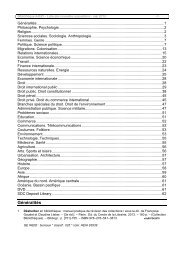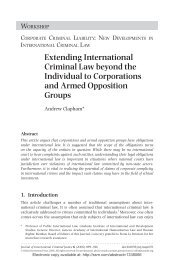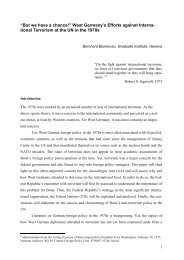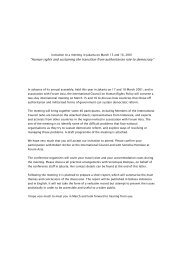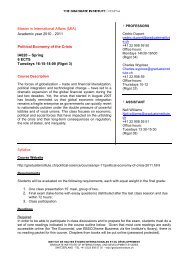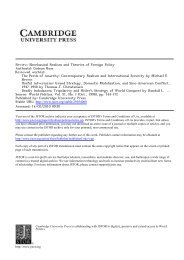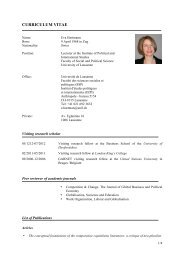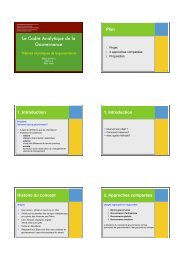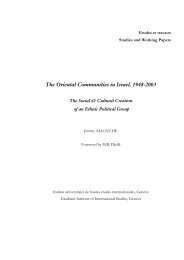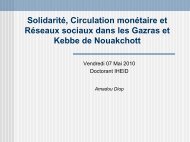Switzerland - The Graduate Institute, Geneva
Switzerland - The Graduate Institute, Geneva
Switzerland - The Graduate Institute, Geneva
Create successful ePaper yourself
Turn your PDF publications into a flip-book with our unique Google optimized e-Paper software.
CENTER FOR STRATEGIC & INTERNATIONAL STUDIES, CSIS<br />
Address<br />
Center for Strategic & International Studies, 1800<br />
K St. NW, Washington, DC 20006<br />
Phone 202-887-0200<br />
Fax 202-775-3199<br />
Web www.csis.org<br />
E-Mail See website for contact forms.<br />
Category Research & Knowledge<br />
MISSION STATEMENT<br />
<strong>The</strong> Center for Strategic and International Studies (CSIS) seeks to advance global security and prosperity in an era of economic and<br />
political transformation by providing strategic insights and practical policy solutions to decision makers. CSIS serves as a strategic<br />
planning partner for the government by conducting research and analysis and developing policy initiatives that look into the future<br />
and anticipate change.<br />
Founding year 1962.<br />
BACKGROUND AND ACTIVITIES<br />
While the Center has numerous programs and research projects, the Post-Conflict Reconstruction Program is focused on conflict and<br />
post-conflict areas around the world, particularly Iraq, Afghanistan, Sudan, and Sri Lanka. <strong>The</strong> Center also analyzes institutional<br />
responses by the U.S. Government, the United Nations, and regional organizations.<br />
One of the projects focuses explicitly on religion and conflict:<br />
ENGAGING WITH RELIGION IN CONFLICT-PRONE SETTINGS<br />
Throughout many of its case studies, the PCR Project has recognized that U.S. and international efforts have consistently failed to<br />
reduce religious risks and engage religious partners effectively. <strong>The</strong> PCR Project aims to provide a more holistic response to address<br />
the weaknesses of international engagement with religious actors in conflict-prone settings, specifically the lack of systematic<br />
analyses and integrated strategies for understanding and interacting with religious actors, as well as an absence of baselines for<br />
measuring progress in this area.<br />
This project aims to assist policymakers and implementing partners in developing their capacity to engage more productively on<br />
issues such as religion's contribution to peacebuilding, the role of faith-based organizations, mobilization techniques used by religious<br />
actors, and the protection of religious minorities in conflict settings. <strong>The</strong> Project will do so by analyzing current practices and<br />
opportunities for improved engagement, and by developing new approaches that consider the religious character of international<br />
actors and potential practices and concepts to adopt from religious organizations.<br />
SELECTED PUBLICATIONS<br />
(2004). Securing Peace: An Action Strategy for Sri Lanka. Workshop on Post-Conflict Reconstruction. Washington DC, Woodrow<br />
Wilson School of Public and International Affairs, Princeton University/Center for Strategic and International Studies (CSIS): 1-44.<br />
Hunter, S. T. and H. Malik (2005). Modernization, Democracy, and Islam. Washington DC, Praeger/CSIS.<br />
Hunter, S. T. and H. Malik (2005). Islam and Human Rights. Washington DC, Center for Strategic and International Studies CSIS.<br />
McGlinchey, E. M. (2005). Revolutions and Religion in Central Asia. PONARS Policy Memo. Washington DC, Center for Strategic and<br />
International Studies/PONARS George Mason University. 364.



![Download [pdf] - The Graduate Institute, Geneva](https://img.yumpu.com/23370020/1/190x248/download-pdf-the-graduate-institute-geneva.jpg?quality=85)
